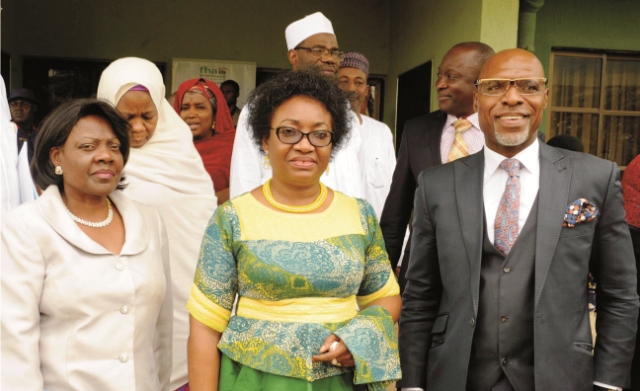Business
FG, SNEPCo Partner On Health Opportunities

The Federal Ministry of Health and Shell Nigeria Exploration and Production Company (SNEPCo) have agreed to explore partnership opportunities in healthcare delivery to boost the health of citizens of the country.
At a just-concluded Health Concepts Validation Exercise organised by SNEPCo in Lagos, the Minister of Health, Prof. Isaac Adewole, identified potential areas of collaboration in the delivery of primary and secondary healthcare.
Unfolding the Federal Government’s vision for the health sector, Adewole said the support of the private sector was key towards ensuring the delivery of affordable healthcare to the people.
The minister commended the Shell deep-water subsidiary for the first-of-its-kind concepts validation exercise.
“The exercise has a good fit with public and private sector collaboration in the delivery of available and affordable healthcare,” the minister said.
In his remarks, General Manager, External Relations of Shell in Nigeria, Mr. Igo Weli, said the company was committed to effective healthcare and had continued to invest in the sector.
“SNEPCo has already implemented health projects and programmes in some states, and we hope that this exercise will help highlight more areas of partnership,” Weli, who represented SNEPCo Managing Director, Mr. Bayo Ojulari, added.
Also speaking at the session, Public Affairs Manager, National Petroleum Investments Management Services, Mr. Ahmed Laminu, who represented the Group General Manager of NAPIMS, Mr. Dafe Sejebor, described the initiative as timely and purposeful.
“This gathering is coming at a most auspicious time when government is calling on well-meaning organisations to assist in the attainment of the Sustainable Development Goal-3 which is good health and wellbeing,” he said.
The Regional Community Health Manager of Shell, Dr Akin Fajola, cited SNEPCo’s achievements in health in parts of Nigeria, and pointed out that the envisaged areas of partnership would be in line with national goals and policies with sustainability in mind.
Health Specialist of the International Finance Corporation of the World Bank, Dr Olumide Okunola, said that new ideas and concepts should be looked at for an economic investment purpose, saying government needs to “look at resources, processes and policies.”
The session brought together a variety of international development agencies, academia and medical professionals who brainstormed along with officials of the Federal Ministry of Health and SNEPCo on the possible areas of support and collaboration.
The 32 participants then went into syndicate sessions on possible intervention options.
The concept validation session is the latest in the effort of SNEPCo to bring effective healthcare to different parts of Nigeria.
In co-operation with NNPC and its co-venturers, SNEPCo strengthened emergency care, set up five Hemo-Dialysis machines and breast cancer mammography screening services at the Iyi-Enu Mission Hospital in Anambra State, developed the capacity of health workers in seven states in the South West and South South regions, and supported the HEWS Foundation for the repair of congenital cleft lip and palate.
It also supported the Extended Hands Foundation for the repair of about 50 Vesico-Vaginal fistulas across the country.
It has equipped the health centre at the SOS Village, Isolo, Lagos and supported a neonatal hearing screening programme at the University of Ilorin Teaching Hospital.
Business
Agency Gives Insight Into Its Inspection, Monitoring Operations

Business
BVN Enrolments Rise 6% To 67.8m In 2025 — NIBSS

The Nigeria Inter-Bank Settlement System (NIBSS) has said that Bank Verification Number (BVN) enrolments rose by 6.8 per cent year-on-year to 67.8 million as at December 2025, up from 63.5 million recorded in the corresponding period of 2024.
In a statement published on its website, NIBSS attributed the growth to stronger policy enforcement by the Central Bank of Nigeria (CBN) and the expansion of diaspora enrolment initiatives.
NIBSS noted that the expansion reinforces the BVN system’s central role in Nigeria’s financial inclusion drive and digital identity framework.
Another major driver, the statement said, was the rollout of the Non-Resident Bank Verification Number (NRBVN) initiative, which allows Nigerians in the diaspora to obtain a BVN remotely without physical presence in the country.
A five-year analysis by NIBSS showed consistent growth in BVN enrolments, rising from 51.9 million in 2021 to 56.0 million in 2022, 60.1 million in 2023, 63.5 million in 2024 and 67.8 million by December 2025. The steady increase reflects stronger compliance with biometric identity requirements and improved coverage of the national banking identity system.
However, NIBSS noted that BVN enrolments still lag the total number of active bank accounts, which exceeded 320 million as of March 2025.
The gap, it explained, is largely due to multiple bank accounts linked to single BVNs, as well as customers yet to complete enrolment, despite the progress recorded.
Business
AFAN Unveils Plans To Boost Food Production In 2026
-

 News2 days ago
News2 days ago2026 Budget: FG Allocates N12.78bn For Census, NPC Vehicles
-

 Featured5 days ago
Featured5 days agoRSG Kicks Off Armed Forces Remembrance Day ‘Morrow …Restates Commitment Towards Veterans’ Welfare
-

 Featured5 days ago
Featured5 days agoTinubu Hails NGX N100trn Milestones, Urges Nigerians To Invest Locally
-
News5 days ago
Benin: FG Secures Release Of Nigerian Pastor
-
News5 days ago
NAF, US Officials Meet To Fast-Track Delivery Of Attack Helicopters
-
News5 days ago
Arrest Arise TV Crew Attackers Or Face Boycott, Journalists Tell Rivers Police
-

 News5 days ago
News5 days agoFast-Track Approval Of NDDC N1.75trn Budget, Group Begs N’Assembly
-

 Sports2 days ago
Sports2 days agoAFCON: Osimhen, Lookman Threaten Algeria’s Record

